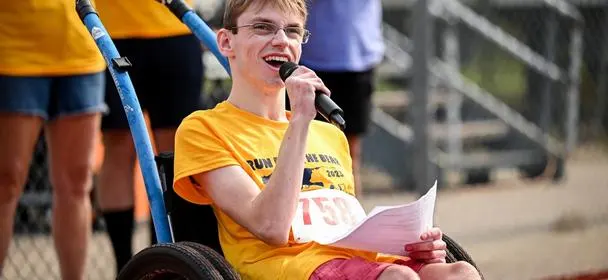Through Longitudinal Interprofessional Family-based Experience (LIFE), U-M students learn directly from patients and families about the realities of navigating complex health care systems and the importance of teamwork. Families generously open their lives to interprofessional student teams, helping future health professionals see care from the patient’s perspective, understand one another’s roles, and build the trust and communication that make comprehensive care possible.
One of those families is the Prouts, and Larry Prout Jr.’s story powerfully illustrates why interprofessional teamwork matters. Read his story below.
When Larry Prout Jr. was born, his parents were told he might not survive the day.
He did. And over the next 24 years, Larry’s life would become a testament not only to his own resilience, but to the power of interprofessional care.
Diagnosed with spina bifida, short bowel syndrome and other complex conditions, Larry has received care from more than 15 different clinical teams across C.S. Mott Children’s Hospital. He’s undergone over 115 surgeries.
His life has been shaped by pain, setbacks, fierce advocacy, and hundreds of moments when people across disciplines came together to listen, collaborate and do what was best for him.
“It takes a team,” said his mother, Kathryn Prout. “Larry is so complex. His care can’t exist in silos. When it’s done well, when the teams really communicate and respect one another, that’s when we see the difference. That’s what’s kept Larry alive.”
A complex beginning
From the beginning, the Prout family’s journey was defined by medical complexity. Kathryn was 20 weeks pregnant when she received a call from John Park, a pediatric urologist at Michigan Medicine. He explained that Larry had a rare condition, cloacal exstrophy, which meant many of his organs had developed outside his body. It was a call filled with honesty and hope.
“He told us everything Mott could do,” Kathryn said. “He didn’t sugarcoat anything, but he made it clear that we’d be surrounded by a team. That stuck with us.”
The day Larry was born, a resident suggested making Larry a girl, thinking it might be surgically easier. Kathryn was heartbroken. Park stepped in, calming the situation and calling for a patient care conference to bring everyone together.
“That was our first introduction to interprofessional care,” she said. “He taught us how to slow things down, pull in the full team and put Larry’s well-being first.”
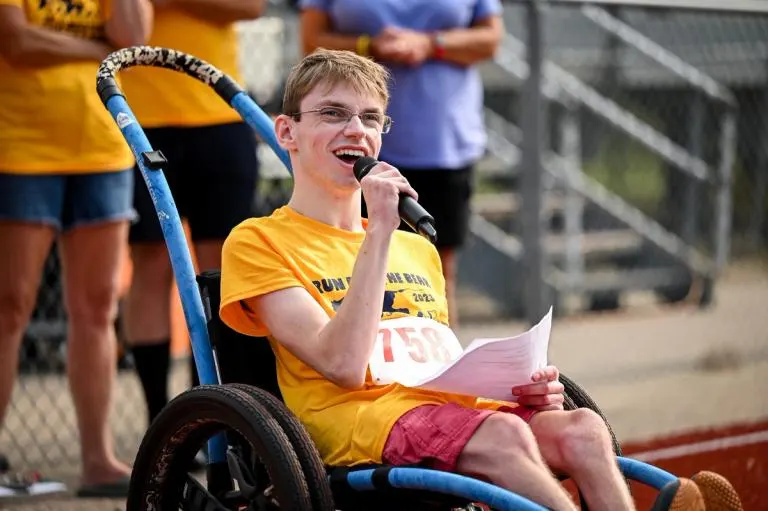
Larry Prout Jr. speaks at the annual “The Bear” Courage Fund 5k. (Photo courtesy of the Larry Prout Jr. Courage Fund)
The power of listening
Over the years, Larry’s life has been filled with moments where collaboration was truly life-saving. In one especially harrowing episode, following a complex abdominal wall reconstruction, Larry developed a massive infection. He began “third-spacing,” retaining more than 50 pounds of excess fluid in his tissues. His oxygen levels dropped. His pain was unbearable.
Despite obvious signs of distress, a new resident and nurse unfamiliar with Larry’s history were hesitant to intervene. Kathryn, drawing on years of experience as an advocate, called for a huddle, a coordinated gathering of everyone involved in Larry’s care.
When that wasn’t enough, a nurse who knew Larry well used a three-digit emergency number specific to the unit. Within minutes, the PICU doctor, attendings, and all of Larry’s services were at the bedside.
“They saw what we saw — he was suffering,” Kathryn said. “They made the call, gave him the meds he needed, and it worked. That kind of collaboration saved his life.”
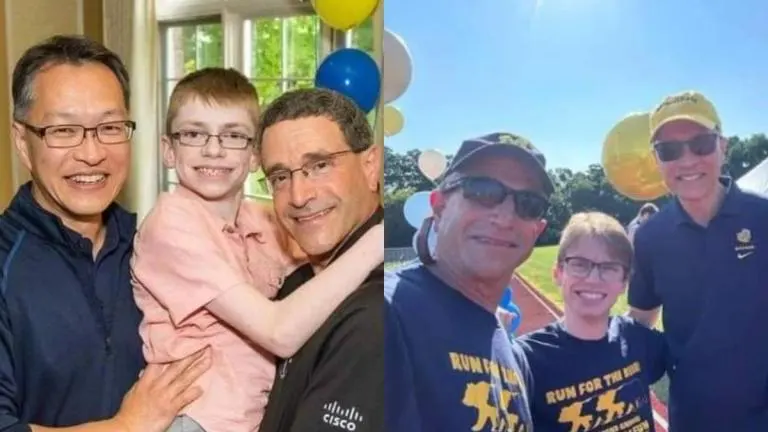
Larry Prout Jr. with John Park and Ronald Hirschl as a child and, right, at “The Bear” Courage Fund 5k in 2024. (Larry Prout Jr. Courage Fund)
Built on relationships
As complex as his medical needs are, Larry’s care is deeply personal. Park and Ronald Hirschl, the Arnold G. Coran Collegiate Professor of Pediatric Surgery and professor of surgery, carried much of the load throughout his life.
He doesn’t refer to his surgeons as “Dr. Hirschl” or “Dr. Park.” He calls them simply “Hirschl” and “Park,” like teammates. To Larry, the surgeons, nurses and staff who have cared for him go beyond being his care team and truly feel like family to him.
“They’re my team,” Larry said. “It’s like football. Everyone has different roles, but they all need to work together. That’s how it works best.”
The relationships go beyond clinical encounters. They’ve played March Madness brackets together, messaged back and forth, and shared walks through the halls of Mott. At the 2024 Bear Run, Park even gave Larry a gentle push to keep going when the course got tough, a moment Larry treasures as part of their bond. Park died in May 2025.
“Kindness is everything,” Larry said. “They’re not just my doctors. They’re my friends, and they’ve helped me feel like myself.”
That deep trust has translated to better care. Larry’s providers listen when he says something doesn’t feel right. His persistence is often what leads to critical decisions, such as his recent push to pursue surgery for intestinal blockages that turned out to be severe adhesions.
“He kept saying, ‘Something’s not right,’” Kathryn said. “Even when the scans weren’t clear, he pushed. And when they opened him up, it was worse than anyone expected. But they listened. They trusted him.”
In 2024, Larry found his own way to celebrate the doctors who had shaped his life. He nominated Hirschl and Park for the Mott Hospital Evan Newport Hope Team Award, describing them not just as surgeons, but as his “one-two punch” and the “captains of my team.” “They have saved my life many times. … They give my mom and dad and five siblings hope.”
Though Hirschl and Park were named finalists, the award ultimately went to the 12 East floor team, the very unit that has cared for Larry for years. For him, that outcome still felt like a win. “I was happy for the 12 East team,” Larry said. “They matter so much to me.”
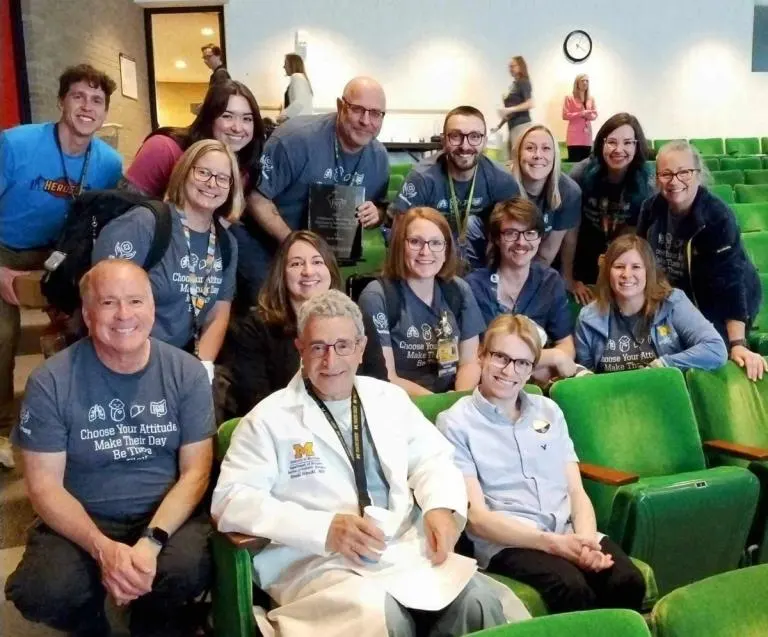
Larry Prout Jr. with Ronald Hirschl and members of the 12 East care team at the 2025 Evan Newport Hope Awards Ceremony. (Kathryn Prout)
A model for interprofessional practice
Larry’s care has been defined by thoughtful, coordinated teamwork across specialties. Pediatric surgery and urology teams regularly consulted one another. Neurosurgery worked side by side with other services during major procedures. Plastics, pulmonology, nephrology, endocrinology, and GI each played critical roles, often in concert with one another, making complex decisions together rather than in isolation.
That same spirit of collaboration extends far beyond the operating room. Nurses, child life specialists, therapists, social workers and technicians have been constants in Larry’s life, helping him heal, adapt and stay connected.
Janitors like Cody, who often talks sports with Larry, show how everyday conversations are part of building trust and belonging. Volunteers, administrators and many others have all added their part to a larger whole.
“There are thousands of people who’ve cared for Larry,” Kathryn said. “And he remembers them. They all matter.”
These layers of teamwork demonstrate that at Michigan Medicine, care is never limited to medical expertise. It is about people from every discipline coming together, sometimes in formal care conferences and sometimes in hallways or playrooms, each contributing something essential to Larry’s journey.
Julie Piazza, senior project manager at Michigan Medicine’s Office of Patient Experience, has walked alongside the Prout family for years.
“What makes Larry’s story so powerful,” she said, “is how clearly it shows that the care being provided goes so far beyond medicine. It is about people, about partnership, and ultimately, about making a positive difference in someone’s life. When we talk about interprofessional education, this is what we mean.”
Transition and legacy
Now 24, Larry is transitioning to adult care, a daunting process, especially for someone whose care has always been so well-coordinated.
“We know the transition will be an adjustment,” Kathryn said. “Mott has been such a well-oiled machine, and now we’re working with new providers who are learning Larry’s history. We feel fortunate to have support as we make that shift.”
Transition coordinator Sheri Gerweck has helped ease that shift, working with Annissa Hammoud, Larry’s longtime pediatrician and now his adult physician at the Brighton Health Center, as well as various adult care teams to identify providers who understand his history and complexity. Still, the adjustment is ongoing.
“Some of his pediatric doctors are licensed to care for adults, like Dr. Hirschl,” Kathryn said. “He told Larry, ‘If you need me, I’ll be there.’ That means the world to us.”
They hope that the adult system recognizes what the pediatric teams have long embraced: The best care happens when families and providers work as one team, with mutual respect and open communication.
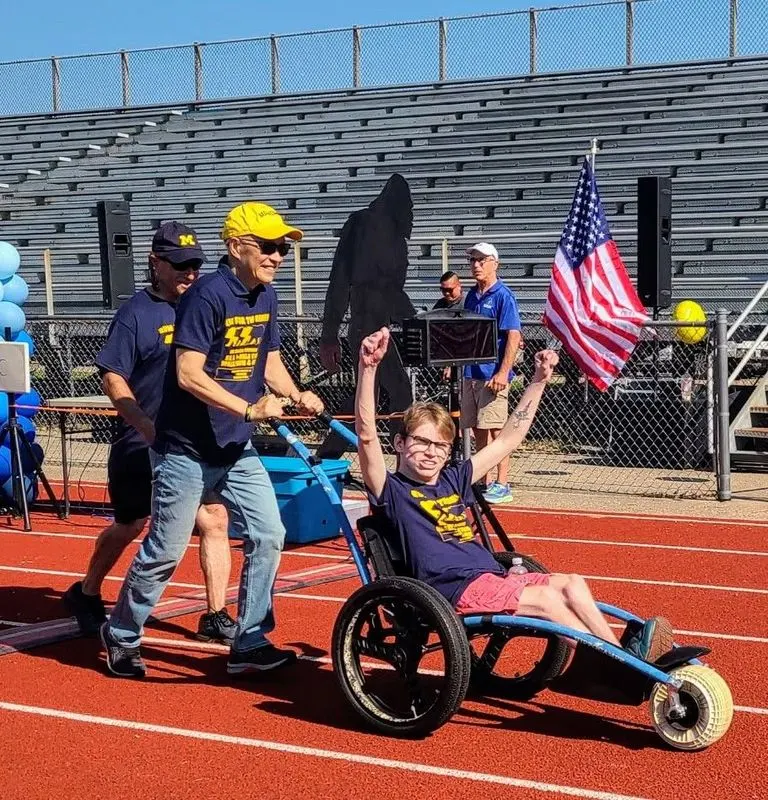
John Park pushes Larry Prout Jr. at “The Bear” Courage Fund 5k in 2024, with Ronald Hirschl following closely behind. (Larry Prout Jr. Courage Fund)
Giving back
Through it all, the Prouts have found a way to give back. In 2020, they launched The Larry Prout Jr. (The Bear) Courage Fund, supporting Mott patients with life-threatening conditions who face financial hardship. The fund has provided critical assistance to many families.
At the annual 5k fundraiser, dozens of caregivers, surgeons, nurses and even Larry’s preschool aide have joined to run and support the cause. “We had help when we needed it,” Kathryn said. “Now we’re helping others. It’s full circle.”
As he continues his journey, Larry remains focused on what matters: independence, health and being heard.
“I want to live a good life,” he said. “I want to feel better, be independent, and have doctors who listen.”
Kathryn echoed the sentiment. “It’s Larry first. Always. And when his teams see that, when they listen to him and to us, that’s when the best care happens.”
